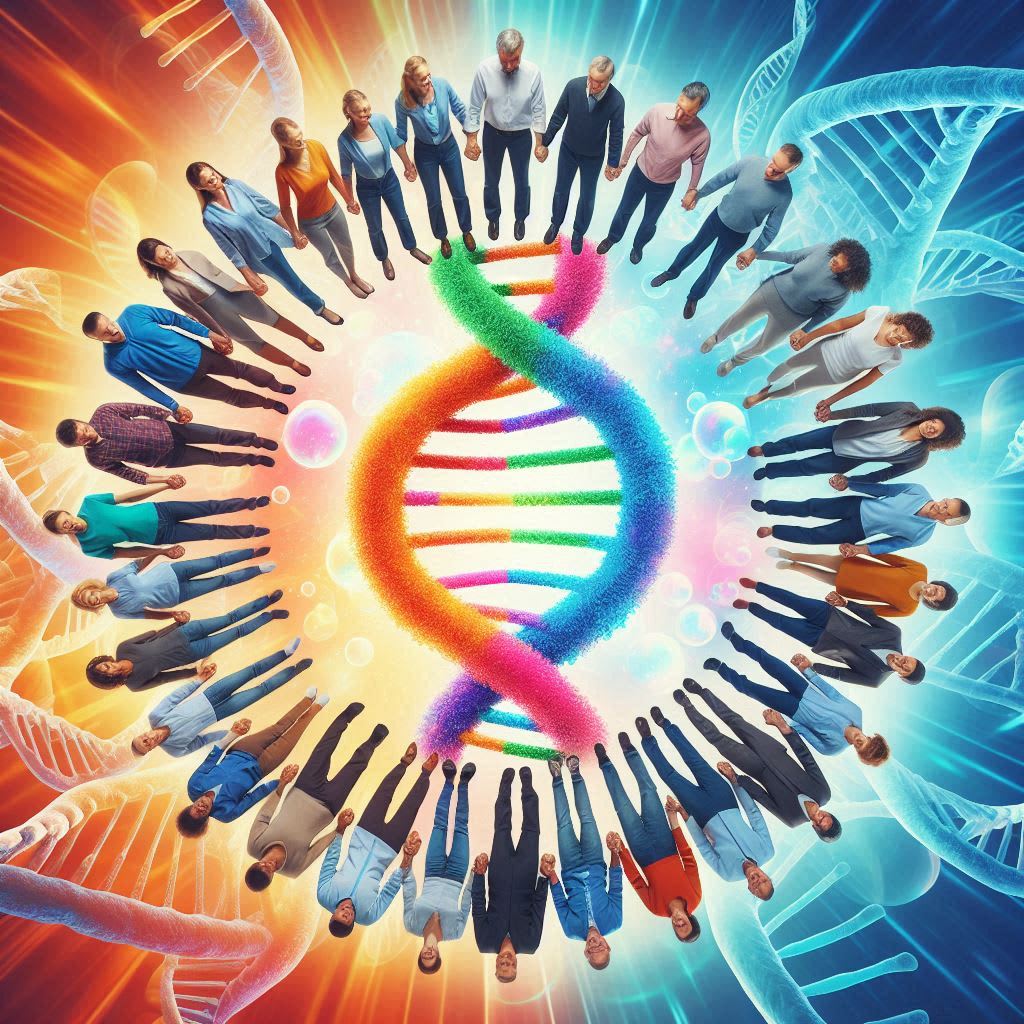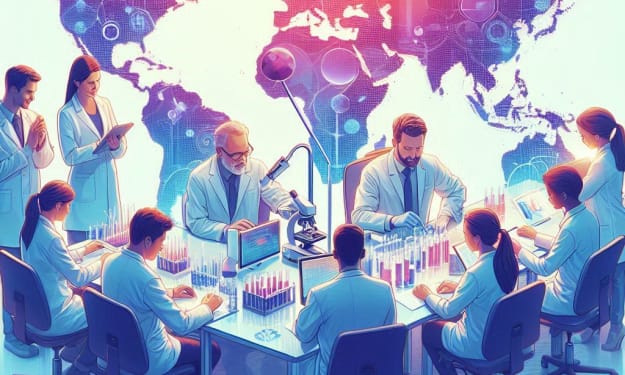Cracking the Human Code: Unveiling the Secrets of the HapMap Project
A Deep Dive into the International HapMap Project

Cracking the Human Code: Unveiling the Secrets of the HapMap Project
Have you ever wondered why some people seem naturally resistant to certain diseases, while others are more susceptible? Or why some medications work wonders for one person but cause side effects in another? The answers might lie within the intricate code of our DNA, and the International HapMap Project is like a powerful decoder ring, helping us unlock these secrets.
Imagine a detailed instruction manual, not for building a bookshelf, but for creating a human being! Our DNA acts as this manual, containing the blueprints for everything that makes us who we are. But just like any well-used manual, our DNA can have slight variations, typos if you will. These variations, called single nucleotide polymorphisms (SNPs), can influence our health, disease susceptibility, and even our ancestry.
The International HapMap Project, launched in 2002, embarked on a groundbreaking mission: to create a comprehensive map of these common variations across diverse human populations. This wasn't about pinpointing individual differences, but rather identifying the common patterns of variations that exist within populations with ancestry from Africa, Asia, and Europe.
Why is This Important?
The HapMap is a game-changer because it offers a powerful tool for understanding the complex dance between our genes and our health. Here's how it sheds light on this intricate relationship:
- Finding the Culprit Genes: By analyzing how these tiny variations (SNPs) cluster together across the genome, researchers can pinpoint regions associated with specific diseases. It's like finding a red flag in the instruction manual, highlighting areas that might be causing problems. This insight allows them to zoom in on candidate genes potentially playing a role in disease development.
- Understanding Your Medication: Our genes can significantly impact how we respond to medications. The HapMap helps researchers identify genetic markers that predict how an individual might metabolize or react to a particular drug. Imagine having a personalized note attached to your instruction manual, explaining how certain tools (medications) might interact with it. This information is crucial for developing personalized medicine approaches, where treatments are tailored to your unique genetic makeup.
- Unveiling Our Ancestry: The HapMap provides valuable clues about human history and migration patterns. By analyzing the distribution of specific SNP patterns across populations, scientists can trace ancestral relationships and migration routes. It's like using the variations in your instruction manual to compare it to others, piecing together your family's history.
Decoding the Code: How Does it Work?
The project focused on a specific type of genetic information called haplotypes. Think of a haplotype as a single copy of the instruction manual you inherit from one parent. By analyzing the genomes of carefully chosen individuals from diverse populations, the HapMap captured millions of SNPs. The key insight lies in the fact that nearby SNPs on a chromosome often tend to be inherited together. This "linkage disequilibrium" allows researchers to predict the variations of nearby SNPs based on the known variation of one SNP.
Imagine searching for a specific sentence in a massive instruction manual. The HapMap acts as a cheat sheet, allowing researchers to predict where related information might be located based on a single keyword. This approach significantly reduces the number of variations needed to examine the entire genome for disease associations.
The Lasting Impact: A Legacy of Discovery
Launched in 2002, the International HapMap Project officially concluded in 2009. However, its impact continues to be felt today. The freely available HapMap data has served as a cornerstone for countless research studies, leading to significant breakthroughs in our understanding of:
- Genetic Risk Factors: The HapMap has helped identify genetic variants associated with a wide range of diseases, including Alzheimer's disease, Crohn's disease, and various types of cancer. This knowledge allows for early screening and preventative measures for individuals at increased risk.
- Personalized Medicine: By understanding how genetic variations influence drug response, the HapMap has paved the way for tailored treatment approaches. This allows doctors to prescribe medications with greater efficacy and fewer side effects.
- Pharmacogenomics: This emerging field, which studies how genes influence drug response, heavily relies on the data generated by the HapMap Project.
Who Benefits?
The beneficiaries of the HapMap Project are vast. Researchers across the globe utilize this data to advance our understanding of human health and disease. Clinicians can leverage this knowledge to implement more personalized treatment approaches. Ultimately, individuals potentially benefit from earlier disease detection, targeted therapies, and a deeper understanding of their own genetic makeup.
The Future Unfolds: Beyond the HapMap
While the HapMap Project laid the groundwork for exploring human genetic variation, the field is constantly evolving. Here's a glimpse into the future:
- The 1000 Genomes Project: This ambitious project built upon the HapMap by analyzing the genomes of a much larger and more diverse population sample. This has provided an even more detailed picture of human genetic variation, offering a more complete instruction manual for our species.
- Next-Generation Sequencing: Technological advancements in DNA sequencing are enabling researchers to analyze entire genomes at an increasingly rapid pace. This allows for a much more comprehensive understanding of an individual's unique genetic makeup, like having a personalized, fully annotated version of your instruction manual.
- Precision Medicine: The ultimate goal of personalized medicine is to tailor healthcare to each individual's unique genetic makeup. The combined efforts of projects like HapMap and continued technological advancements are pushing us closer to this reality. Imagine a future where doctors can use your genetic information to not only identify potential health risks but also prescribe preventive measures and customized treatment plans.
The International HapMap Project stands as a testament to the power of international collaboration and open data sharing in scientific discovery. It serves as a stepping stone on the path towards a future of personalized medicine, where our unique genetic blueprint informs not just disease prevention, but also guides tailored treatment approaches for a healthier future.
This journey of unlocking the secrets of our DNA is far from over. The HapMap Project has provided us with a powerful foundation, and with continued research and innovation, we can move towards a future where our genetic code becomes a key player in promoting health and well-being for all.
Beyond the Science: Ethical Considerations and You
The HapMap Project, while revolutionary, has also sparked discussions about ethics and privacy in the realm of genetics. Here are some key points to consider:
- Informed Consent: Obtaining informed consent from participants is crucial. Understanding how their genetic information will be used and stored is essential for individuals to make informed decisions about participation.
- Privacy Concerns: There's a potential risk of genetic information being misused or falling into the wrong hands. Robust data security measures and clear guidelines on data ownership and usage are necessary.
- Ancestry and Identity: The HapMap Project's focus on population groups can raise concerns about reinforcing racial or ethnic stereotypes. It's important to remember that genetic variation exists within populations, and the project aimed to identify broad patterns, not define individuals.
Who Benefits? There's a concern that advancements in personalized medicine based on genetics might exacerbate existing healthcare disparities. Ensuring equitable access to genetic testing and its benefits remains a challenge.
These are complex issues that require ongoing dialogue and collaboration between researchers, ethicists, policymakers, and the public.
What Does This Mean for You?
The HapMap Project's impact is far-reaching. It has the potential to influence your healthcare in several ways:
- Genetic Testing: As the science advances, you might have the option to undergo genetic testing to identify potential health risks or predisposition to certain diseases. Understanding the limitations and implications of such tests is crucial.
- Personalized Medicine: In the future, your doctor might consider your genetic makeup when making treatment decisions. This could lead to more targeted and effective therapies with fewer side effects.
- Preventative Care: Knowing your genetic risk factors could allow for earlier detection and intervention for certain diseases. This could empower you to make lifestyle changes or pursue preventative measures.
It's important to remember that your genes are not your destiny. They are just one piece of the puzzle when it comes to your health. Lifestyle choices, environment, and other factors also play a significant role.
The journey of unlocking the human code is ongoing, and the HapMap Project serves as a significant milestone. As this field continues to evolve, staying informed and engaging in open discussions about the ethical implications is crucial. By understanding the potential of our genetic information, we can work towards a future where this knowledge empowers individuals and paves the way for a healthier world.
About the Creator
suren arju
Hi there! I'm Suren, your startup guide. Entrepreneur, writer, dreamer - I share insights, tips & stories to fuel your startup journey. Ready to explore, learn & win together? Join me & let's redefine how we launch, learn & leap!
Enjoyed the story? Support the Creator.
Subscribe for free to receive all their stories in your feed. You could also pledge your support or give them a one-off tip, letting them know you appreciate their work.





Comments
There are no comments for this story
Be the first to respond and start the conversation.